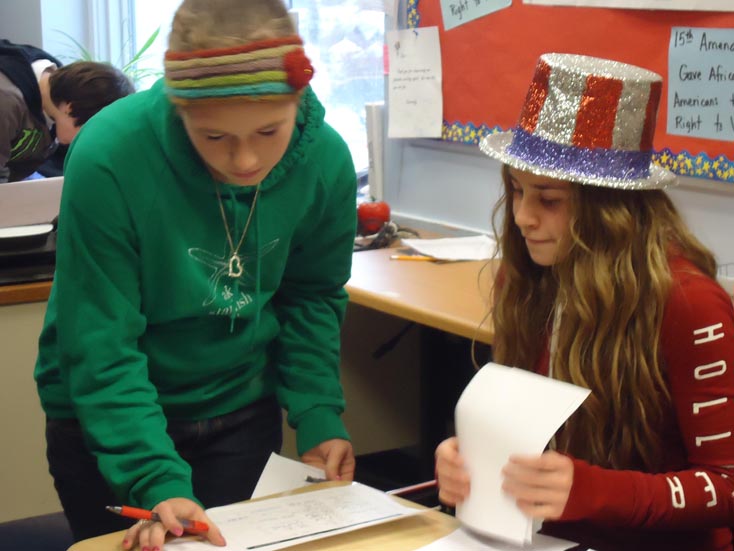While United States voters took to the polls to decide the nation’s next president, Homer Middle School eighth graders did the same thing in a mock election.
With 80 students voting, the results were:
• Romney, 37
• Obama, 29
• Johnson, 14
Those results came after weeks of studying the country’s election process in U.S. history classes taught by Holly Alston, Suzanne Haines and Darcy Mueller.
To make the study more real, a two-party process was put into place: the Do Right Party and the Fair and Square Party.
“They didn’t have a choice of which parties they could be in, we assigned them, so that part wasn’t real,” said Haines.
Each of the five classes was a mini-nation, holding its own campaign. Each party in each class selected a presidential candidate and that candidate chose a vice presidential running mate.
Each party was given a prescribed platform as part of the simulation. It included positions on military appropriations, health services, unemployment, women’s rights, energy policy, nuclear power, taxes, environment, gun control, free speech, education and federal lands.
“That was the hardest thing for the kids,” said Alston. “They might not necessarily believe in the platform, but the purpose of the simulation was here’s what the platform is.”
Incorporating the party platform into a three- to five-minute speech for the presidential candidates also was challenging and led to suggestions that, in future simulations, students would develop their own platform.
“Obviously they couldn’t talk about all 12 topics, so they had to pick out ones they thought were most important and then we talked about how the vice president could address other things,” said Alston.
The students also learned the difference between the popular vote and electoral vote, a process that confuses even adult voters.
Each state has a number of electors equaling that state’s U.S. congressional representation. In Alaska, there are three electors. Each of Alaska’s electors must “pledge” that as an elector, that person will cast his or her electoral vote for the candidate of the party. On Election Day, whichever presidential candidate wins the popular vote in the state wins the “pledged” votes of the state’s electors.
The electors from each state are ultimately the ones that cast the Electoral College vote that elects the president and vice president.
To simplify the process, each Homer Middle School student had one popular vote and also one electoral vote.
Prior to voting, the students also examined other questions that go on a ballot besides the names of presidential and vice presidential candidates, such as the candidates for state races, judges and propositions.
Election behavior also was addressed during the study.
“Because this has been a very emotional election, we asked the kids to be respectful of each other’s points of view and families’ points of view, and they have been,” said Haines, adding that an analytical, rather than emotional, approach has been encouraged.
Voting booths borrowed from Homer City Hall added an air of authenticity to the individual class elections. Student election clerks checked the “voter registration book” by comparing signatures. Voting was done with ballots made to look like the real thing. And “I voted” stickers were handed out to student voters.
“The kids have been really excited about this,” said Alston. “They are talking about conversations they have with their moms and dads. A couple of people have made it a daily dinner conversation. We just had parent-teacher conferences and a lot of parents said they’ve been talking about it. Some students said their parents weren’t even going to vote, but are now.”
Haines has seen the same sort of response from her students.
“They are much more spirited about being in the process,” said Haines. “I hope that holds until they’re 18.”
On Monday, eighth-graders were given a final exam on the unit. It covered everything they had studied, from when a person declares his or her candidacy to run for president all the way through the election. One of the questions was, “If you could change the system, what would you do?”
Suggestions included:
•Eliminating the electoral college in favor of the popular vote;
•Requiring candidates to campaign in all 50 states;
•Eliminating the requirement for presidential candidates to be born in the United States, because it doesn’t mean they won’t be a good candidate or good leader;
•Requiring that a presidential candidate live in the United States a long time and be an American citizen.
The students’ homework for Tuesday: Write a current event paragraph about what they learned from Tuesday’s national election to be used for class discussion on Wednesday.
McKibben Jackinsky can be reached at mckibben.
jackinsky@homernews.com.



